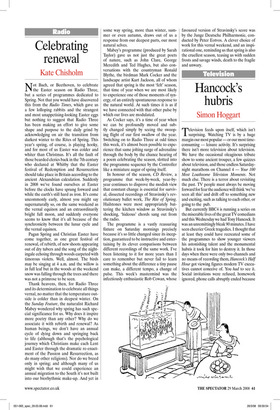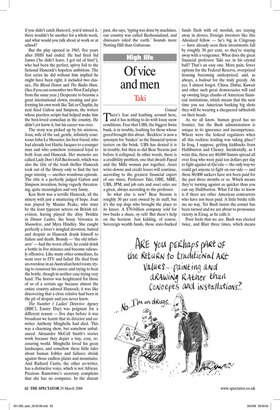Hancock’s hubris
Simon Hoggart
Television feeds upon itself, which isn’t surprising. Watching TV is by a huge margin our most popular — or our most timeconsuming — leisure activity. It’s surprising there isn’t more television about television. We have the occasional oleaginous tribute show to some ancient trouper, a few quizzes about television, and those endless Saturdaynight marathons on Channel 4 — Your 100 Most Loathsome Television Moments. Not much else. There is a terror about revisiting the past. TV people must always be moving forward for fear the audience will think ‘we’ve seen all this’ and drift off to something new and exciting, such as talking to each other, or going to the pub.
But currently BBC4 is running a series on the miserable lives of the great TV comedians and this Wednesday we had Tony Hancock. It was an unremittingly bleak 90 minutes. I have seen cheerier Greek tragedies. I thought that at least they could have recreated some of the programmes to show younger viewers his astonishing talent and the monumental hubris it took for him to destroy it. In those days when there were only two channels and no means of recording them, Hancock’s Half Hour got viewing figures modern TV executives cannot conceive of. You had to see it. Social invitations were refused, homework ignored, phone calls abruptly ended because if you didn’t catch Hancock, you’d missed it, there wouldn’t be another for a whole week, and what would you talk about at work or at school?
But the play opened in 1965, five years after HHH had ended. He had fired Sid James (‘he didn’t leave, I got rid of him!’), who had been the perfect, spivvy foil to the fictional Hancock’s hopeless ambitions. The first series he did without him implied he might have been right; it included two classics, The Blood Donor and The Radio Ham. (See if you can remember two West End plays from the same year.) Desperate to become a great international clown, creating and performing his own work like Tati or Chaplin, he next fired Galton and Simpson, the writers whose peerless scripts had helped make him the best-loved comedian in the country. He didn’t yet know it, but his career was over.
The story was picked up by his mistress, Joan, wife of the sad, gentle, infinitely courteous John Le Mesurier, his best friend, who had already lost Hattie Jacques to a younger man and who somehow remained loyal to both Joan and Hancock. Her memoirs are called Lady Don’t Fall Backwards, which was also the title of the trash thriller Hancock took out of the library only to find the last page missing — another wondrous episode. The title is a perfectly judged Galton and Simpson invention, being vaguely threatening, quite meaningless and very funny.
Ken Stott was a terrific Hancock, all the misery with just a smattering of hope. Joan was played by Maxine Peake, who must be the least typecast actress on British television, having played the ditsy Twinkle in Dinner Ladies, the bossy Veronica in Shameless, and Myra Hindley. She caught perfectly a lover’s mingled devotion, hatred and despair as Hancock drank himself to failure and death. Brandy — ‘the old infuriator’ — had the worst effect; he could drink a bottle in five minutes and become odiously offensive. Like many other comedians, he went over to ITV and failed. He died from an overdose in an Australian hotel room, trying to resurrect his career and trying to beat the bottle, though in neither case trying very hard. The horror was heightened for those of us of a certain age because almost the entire country adored Hancock; it was like discovering that a close relative had been in the pit of despair and you never knew.
The Number 1 Ladies’ Detective Agency (BBC1, Easter Day) was poignant for a different reason — five days before it was broadcast we learnt that its director and cowriter Anthony Minghella had died. This was a charming show, but somehow unbalanced. Alexander McCall Smith’s stories work because they depict a tiny, cosy, reassuring world. Minghella loved his great landscapes, and somehow these little tales about human foibles and failures shrink against those endless plains and mountains. And Richard Curtis, the other co-writer, has a distinctive voice, which is not African. Precious Ramotswe’s secretary complains that she has no computer. In the distant past, she says, ‘typing was done by machines, our country was called Bechuanaland, and dinosaurs ruled the earth.’ Sounds more Notting Hill than Gabarone.

















































































 Previous page
Previous page